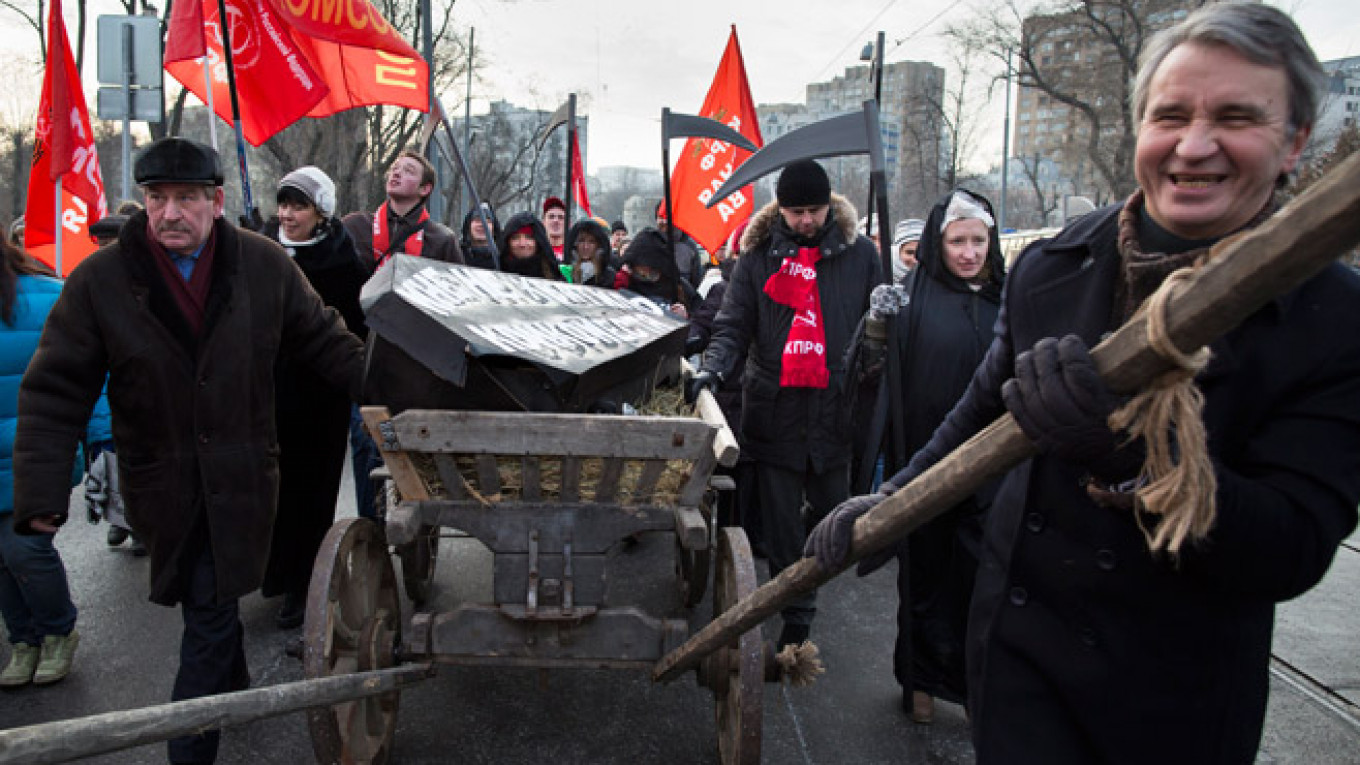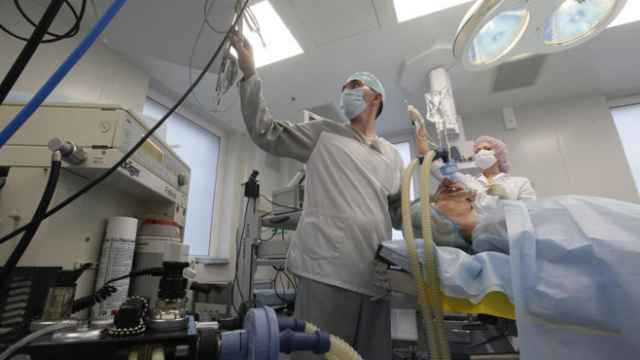More than a thousand health care workers took to the capital's streets Sunday to keep the pressure on authorities amid ongoing medical reforms that critics say are being conducted for financial gain over anything else.
The reforms, which were initiated by President Vladimir Putin upon his return to the presidency in in 2012, have been ongoing for several years but only recently became cause for widespread concern after it became known that 28 hospitals would be closed in the capital alone and thousands of medical workers laid off.
City officials say the reform will boost efficiency by merging smaller clinics that lack the full range of medical services with larger centers capable of treating a wider range of illnesses. They say it is necessary to optimize a decrepit Soviet-era system.
Semyon Galperin and Olga Demicheva, two of the protest's organizers and staff members at the city's Hospital No. 11, insist they are not opposed to reforming the health care system, but that the current plan was made without taking into account input from medical workers themselves.
On Sunday, demonstrators issued two demands to authorities: stop the ongoing health care reform that has seen hundreds of medical workers laid off, and hold proper discussions with all parties concerned before continuing with the plan.
Estimates on attendance varied, with Moscow police putting turnout at 1,500 people but media and some participants citing figures of between 4,000 and 10,000.
Some demonstrators carried signs in the shape of the grim reaper or even dressed as the reaper himself. Others carried a life-size coffin with a dummy inside, bearing the caption: "There weren't enough hospital beds for me."
Another banner read: "Save money on war, but not on doctors."
Similar protests were held in cities across the country over the weekend, including St. Petersburg, Perm, Bryansk, Vladivostok and Blagoveshchensk.
Public Pressure
Galperin told The Moscow Times ahead of the Moscow march that the movement against the current reforms had already had an impact and forced city authorities to listen to critics' demands.
"We have already achieved some things: They agreed to consider our restructuring plan," Galperin said, adding, however, that many of the authorities' promises had so far proven to be "lies."
Just over a week ago, Putin appeared to react to the outcry by asking Moscow City Hall to reconsider its current reform plan. Several days later, the presidential human rights council urged city officials to stop laying off medical workers.
After a series of City Hall roundtable discussions, Moscow Mayor Sergei Sobyanin offered laid-off medics one-off payments of up to 500,000 rubles ($10,700) per doctor on top of the severance pay to which the employees are entitled under the law.
On Sunday, health care workers seemed unmoved by the offer, with many demanding not only that the reforms be halted, but that the city official in charge of the reforms be sacked.
Leonid Pechatnikov, the deputy mayor for social issues, came under fire for what demonstrators said were false promises and lies made to keep health care workers in check.
Galperin called from the stage for Pechatnikov's ouster, and the crowd chanted "Resign!" in response.
Efficiency or Profit?
Alla Mamontova, a psychologist and the deputy chair of Moscow's Coordination Council for the Methodical Union of Psychologists, took to the stage to condemn what she described as the financial motives for the reforms.
"I have personally seen the crocodile they are calling 'optimization,'" Mamontova said. "They carried out these reforms using the excuse that it would increase everyone's pay. Sure, the salaries increased, but only for administrators … and that is exactly what we're seeing right now [throughout the city.]"
Many demonstrators echoed Mamontova's concerns, saying officials had put profits above people's health in preparing the current reform plan.
"It's all purely about money. They're closing down the hospitals with valuable land plots in order to sell the land to private clinics for profit. This is elite real estate in the center of the city, much of it in historic buildings," said Yakov Gorenbein, a medic who attended the protest.
"There will only be one oncological hospital left in Moscow after the reforms. And there are already such long lines there," Gorenbein said, referring to Oncological Hospital No. 52.
"These people are making money. They aren't thinking about how people will get treatment; that doesn't seem to worry any of them. They're thinking about how to line their pockets with more money," Gorenbein said.
Psychiatric Overflow
One of Moscow's major psychiatric hospitals is set to be closed down as part of the reforms, sparking fears that people suffering from acute psychiatric disorders will be left without treatment.
A report released by the Meduza news portal last week cited staff members at the hospital, Psychiatric Hospital No. 14, as saying some doctors had already been notified of their dismissals.
According to the website of the Russian Medical Server, a forum for medical professionals, the hospital is set to close completely by next September, leaving hundreds of patients with severe mental disorders with nowhere to go.
Although city officials have said patients can be transferred to the city's other psychiatric hospital, Hospital No. 15, psychiatrists and staff members at Hospital No. 14 have expressed doubts about the feasibility of this plan.
"There isn't really anywhere to transfer them, there are redundancies happening everywhere. It's just not clear how they can close a hospital of this type. Let's close all the prisons and let the rapists and pedophiles out," a nurse at Hospital No. 14 was cited by Meduza as saying on condition of anonymity.
She said many of those left with nowhere to go suffered from schizophrenia, psychotic episodes, suicidal tendencies and major depression.
City authorities have suggested outpatient treatment, which does not cost as much and is not long term.
But Yelizaveta Zhestkova, a doctor at Hospital No. 14, scoffed at this suggestion in an interview with Meduza, saying that most of the patients at the facility are "aggressive."
"They want to transfer all of them to outpatient treatment, so that they come for treatment themselves. They need to understand that there is not a single nurse or medic who has not been attacked by a patient here. I had one patient who killed her own child because she was psychotic and hearing voices. These are the people [the authorities] expect to seek treatment themselves," Zhestkova said in comments carried by Meduza.
"This hospital will be closed, but there aren't enough beds in other hospitals — which means these aggressive patients will be out on our streets, in our courtyards, in the entrances to our apartment buildings. I'm scared. They could attack people. They are psychotic, and if the voices tell them to hit someone, they will go and hit someone. The state isn't thinking about that," Zhestkova said.
Contact the author at [email protected]
A Message from The Moscow Times:
Dear readers,
We are facing unprecedented challenges. Russia's Prosecutor General's Office has designated The Moscow Times as an "undesirable" organization, criminalizing our work and putting our staff at risk of prosecution. This follows our earlier unjust labeling as a "foreign agent."
These actions are direct attempts to silence independent journalism in Russia. The authorities claim our work "discredits the decisions of the Russian leadership." We see things differently: we strive to provide accurate, unbiased reporting on Russia.
We, the journalists of The Moscow Times, refuse to be silenced. But to continue our work, we need your help.
Your support, no matter how small, makes a world of difference. If you can, please support us monthly starting from just $2. It's quick to set up, and every contribution makes a significant impact.
By supporting The Moscow Times, you're defending open, independent journalism in the face of repression. Thank you for standing with us.
Remind me later.






